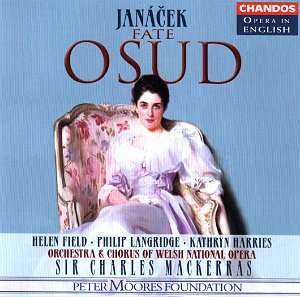
This recording dates from July 1989 and although not credited by Chandos
I presume it is the one first issued by EMI in 1990 on CDC7 49993-2, which
I regret I do not have for comparison. Here it has been remastered for Chandos
by Peter Newble in their ongoing Peter Moores Foundation "Opera in English"
series, and is enormously vivid both in performance and recorded sound.
Although written in 1905, Osud was never played in its composer's
lifetime, and it is less than thirty years since the unperformed and then
almost unknown score was heard in the West. Most British admirers of Janacek
were surely first awakened to the music's power by the BBC's early 1970s
production conducted by Vilem Tausky. Then came the Brno State Theatre Opera
recording on Supraphon LPs conducted by Frantisek Jilek first issued in 1978
(SUP 2011/2). It was followed by the ENO English-language production in a
double bill with the Weill/Brecht Mahagonny Songspiel first seen in
September 1984, and later broadcast by the BBC in March 1985. So cumulatively
one became aware of the power of Janácek's music, its passionate lyricism
giving the apparently mundane evocation of a central European Spa Town in
the sunshine in Act I, a pantheistic intensity which even when listening
to the Czech text made it riveting.
With the advantages of Mackerras on the podium, digital sound and performers
that believe in it, the music is now projected wonderfully, Janácek
at his most incandescent. Mackerras and his singers are perfectly attuned
to Janácek's sound-world, and the vocal line inflected by its Czech
libretto seems to me to lose nothing in its English translation, when sung
by Langridge and Field. The role of, the composer, Zivný, is one of
Janácek's biggest male roles, very much the composer speaking, with
extended monologues in both Acts I and III, and Langridge lives the role,
his authority the result of his having had the opportunity of working into
the part after many stage appearances both with ENO and the Welsh. His words,
too, are clearly articulated and easy to follow.
The plot, which includes substantial autobiographical elements, and an emotional
world informed by Janácek's torment at the death of his beloved daughter,
Olga, at the age of 20, opens with the evocation of a busy Spa Town where
Zivný and Míla, lovers of a few years ago, meet by chance.
Míla's mother has succeeded in separating them and Míla has
had their son, Doubek. Zivný has written an opera encapsulating his
bitterness at their parting. Now at the end of the first act they go off
together.
The second act is set four years later; the two are married, the mother deranged
by what she sees as a family catastrophe. Zivný plays his opera and
impulsively starts to destroy it, interrupted by Doubek asking "do you know
what love is". His grandmother mocks and then tries to throw herself from
the balcony; in trying to restrain her mother, both Mila and the old woman
fall to their deaths. The scene moves on another eleven years (the score
says "the present"); Zivný is now professor at the Conservatoire.
Students, one of whom is Doubek, are playing through his opera. They ask
the composer to tell them about it, and he does so with such passion that
he conjures up a vision of his dead wife, and collapses. He dies maintaining
that the unfinished last act of the opera is "in God's hands".
This plot is far less coherent than the music, but frankly, for me, if one
judged operas by their plots one would have given up much of the repertoire
long ago: this is an ideal recorded opera - glorious music wonderfully projected
by the singers. Osud is notable for its huge cast of minor roles,
and here the benefits of being able to tap the depth of a repertoire company
at its peak means that each cameo is a living portrait. Here we have
Janácek's wonderful build up of conversation, the interplay of holiday
visitors to the Spa town, and the repartee of students in the third act.
Chandos give us 20 access points ideal for getting to grips with so kaleidoscopic
a work, and all the plums are easily accessible for repeated listening. This
is a hugely rewarding music, and if you do not already have it Chandos's
recording is an essential score for many music lovers.
Reviewer
Lewis Foreman

